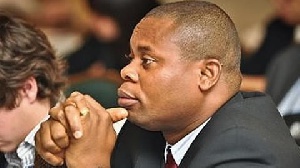An IMF [International Monetary Fund] Team has been in Ghana since last week for a possible rescue programme for the country’s ailing economy.
The team met with Ghanaian economic gurus after which they made a strong case for economic support from the Washington lender.
However, the IMF team also sought clarity on proposals by Ghana government on how the embattled economy should be rescued.
Ghana’s team which met the IMF team was led by former Minister of Finance Professor Kwesi Botchwey, current Finance Minister, Seth Terkper, Employment Minister, Haruna Iddrissu, and Governor of the Bank of Ghana, Dr. Kofi Wampah.
However, experts say Ghana would not have to request too much financial support from the IMF because of the recent 3 billion dollars the country raised from its bond issue, as well as money it holds from the cocoa loan syndication.
Nonetheless, the Founding President and CEO of policy think tank, IMANI Ghana, Franklin Cudjoe believes the IMF-Ghana talks are going on well but claims there are some “incidents”.
According to Franklin Cudjoe, whilst the IMF is here, and when they are gone, we should do the following as well to deepen accountability as seen in the eyes leading of Civil Society leaders.
Read below Franklin's view on IMF-Ghana negotiations posted on his Facebook. [Unedited]
The IMF Ghana negotiations are going well, with incidents! I shall return to the subject of incidents later, but just a hint to say they bother on data credibility; the very factor I mentioned delayed Zambia's IMF deal.
However, whilst the IMF is here and when they are gone, we should do the following as well to deepen accountability as seen in the eyes leading of Civil Society leaders.
Get the national accounting system (GIFMIS) working. It looks like Finance Minister Terkper's very life depends on this, even though it appears it may be weakening even before it started achieving results for the simple reason that it is based on a shaky accounting system and culture that doesn't exist.
I still insist that the likes of Herman Chinery-Hesse can develop software for less than $1m instead of the $80m spent on GIFMIS so far.
Government should fast-track (BOOST) the creation of an open database of all the projects funded.
Demand a more aggressive implementation of Open Government Partnership (OGP) Action Plan and the publishing of citizen’s budget, pre-budget statement, and End of Year report which would improve citizen’s access to budget information and GOG’s Open Budget Initiative.
Get broader national representation on boards of public institutions – the current set up rewards political allies (e.g. at Pensions Management, lots of misappropriations of pension funds) and fuels mismanagement and corruption. Leaders with integrity from CSOs and reps of professional associations are better choices.
Fast track establishing a Budget Office in Parliament; and get this office involved in budget preparation and budget compliance.
Public Accounts Committee regularly calls public hearings on Auditor General report, and does political sanctions of GOG officials and institutions questioned in report; they must be financial sanctions as well.
Poverty Reduction Committee calls public hearings on NDCP report about GOG compliance with poverty reduction targets.
Establish a Law on Mineral Revenues similar in principles to the Petroleum Revenues Law so that mineral and forestry is included –thus improving natural resource revenue management.
On the medium term:
Create a Fiscal Responsibility Law (there is a draft bill by the bank of Ghana): Before the 2016 budget process discussions commence, the GOG should have approved a fiscal responsibility law.
Implement a National Anticorruption Action Plan that has independent oversight by CSOs –with special provisions for Attorney General to prosecute corruption cases cited by Public Accounts Committee.
General News of Sunday, 28 September 2014
Source: peacefmonline.com













